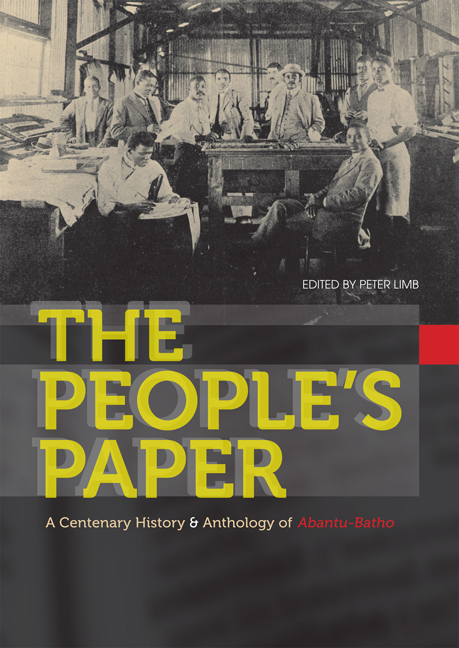Book contents
- Frontmatter
- Contents
- Contributors
- Acknowledgements
- Preface
- List of Abbreviations and Acronyms
- List of Illustrations
- PART I Essays
- Overview
- FOUNDERS AND EDITORS
- Chapter 3 Pixley Seme and Abantu-Batho
- Chapter 4 Queen Labotsibeni and Abantu-Batho
- Chapter 5 ‘We of Abantu Batho’: Robert Grendon's Brief and Controversial Editorship
- THEMES AND CONNECTIONS
- PART II Anthology
Chapter 3 - Pixley Seme and Abantu-Batho
from FOUNDERS AND EDITORS
Published online by Cambridge University Press: 21 April 2018
- Frontmatter
- Contents
- Contributors
- Acknowledgements
- Preface
- List of Abbreviations and Acronyms
- List of Illustrations
- PART I Essays
- Overview
- FOUNDERS AND EDITORS
- Chapter 3 Pixley Seme and Abantu-Batho
- Chapter 4 Queen Labotsibeni and Abantu-Batho
- Chapter 5 ‘We of Abantu Batho’: Robert Grendon's Brief and Controversial Editorship
- THEMES AND CONNECTIONS
- PART II Anthology
Summary
Pixley ka (‘son of’) Isaka Seme founded Abantu-Batho in 1912. To understand how he came to establish the paper, we need to consider his early life up to that point and the influences that led him to conceive of setting up a newspaper linked to the South African Native National Congress (SANNC), in the founding of which he was the central figure.
Although we still await a full biography of Pixley Seme, the outlines of his early life are well known. By his own account he was the fourth son of Isaka Sissonka Kuwana Seme, also known as Marsh Isaac, a transport rider who had settled at the American Board Mission in the 1850s in what was then the colony of Natal and is now the province of KwaZulu-Natal. Pixley Seme was born in October 1881 at the Inanda mission run by the American Zulu Mission outside Durban. He took his first name from Rev. S. C. Pixley, the American Congregational missionary at Inanda, who brought him up after his parents died. Sometime later he Africanised Isaac to Isaka.
A precocious child, Seme moved from Inanda to the Adams Training School for boys at Amanzimtoti, south of Durban, at the age of 14, and two years later, thanks to the support he was given by Rev. Pixley, he left for the United States. In going there he followed his relative (he sometimes called him ‘cousin’) John Dube, who was ten years older. When he arrived in New York he went directly to where Dube was staying in Brooklyn. Seme's eight years in the United States were seminal to his later career. After graduating from Mount Hermon school in rural Massachusetts he entered the prestigious Columbia University in New York while living in nearby Harlem. From Dube he had learned of the work of Booker T. Washington at the Tuskegee Institute in Alabama and he now became aware of the potential for links between African Americans and people in Africa. Before leaving America he travelled south and heard Washington speak. Referring to this occasion many years later and to unity among African Americans in the United States, he said that he would ‘never forget the great vision of national power which I saw in Atlanta’.
- Type
- Chapter
- Information
- The People’s PaperA Centenary History & Anthology of Abantu-Batho, pp. 117 - 127Publisher: Wits University PressPrint publication year: 2012



